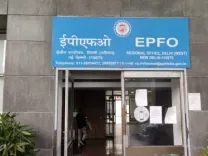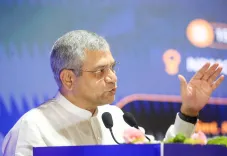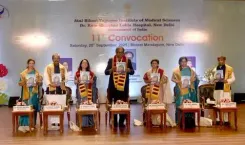Can the Ayush Sector Define India’s Leadership in Integrative Medicine?

Synopsis
Key Takeaways
- Ayush sector has potential to enhance India's leadership in integrative medicine.
- Collaboration among stakeholders is essential for holistic growth.
- Focus on Ayurveda, Unani, and other traditional systems for global prominence.
- Policy innovation and research frameworks are key to mainstreaming Ayush.
- Ayush is evolving into a critical pillar of India's health and economic future.
New Delhi, July 31 (NationPress) The Ayush sector holds significant promise in shaping India’s role in integrative medicine, declared Prataprao Jadhav, the Union Minister of State for Ayush, on Thursday.
Speaking at the ‘Ayush Stakeholders Consultative Meeting 2025’ hosted by FICCI in collaboration with the Ministry of Ayush, Jadhav reiterated the government’s dedication to fostering comprehensive development within the Ayush sector.
Highlighting the concept of Atmanirbhar Bharat, he urged industry stakeholders to work together to elevate ayurveda, siddha, unani, sowa-rigpa, naturopathy, yoga, and homoeopathy to an international stature.
“We need to collectively make Ayush systems the preferred choice in both preventive and therapeutic healthcare — at home and abroad,” Jadhav stated.
“Transitioning from ‘Vocal for Local’ to ‘Global for Local’, this sector is poised to establish India’s leadership in integrative medicine,” he added.
Vaidya Rajesh Kotecha, Secretary of the Ministry of Ayush, stressed the Ministry’s commitment to integrating Ayush through innovative policy, research-oriented frameworks, and collaborative institutional efforts.
He also outlined key priorities such as inter-ministerial cooperation, evidence-based policy development, and enhancing capacity for global integration and effective delivery.
Meanwhile, Dr. Pradeep Multani, Chair of the FICCI Ayush Committee, emphasized the necessity for cohesive regulatory reforms within the sector.
Multani advocated for support directed at Micro, Small, and Medium Enterprises and startups in the Ayush domain, alongside facilitating international market access and establishing robust data frameworks.
He shared FICCI’s crucial initiatives and actionable recommendations on matters including Rule 170, the Biological Diversity Act, and the modernization of the Drugs and Magic Remedies Act.
The meeting convened prominent figures from government, industry, and academia to collaboratively discuss a strategic trajectory for India’s Ayush sector, emphasizing quality, innovation, integration, and global outreach.
Experts asserted that Ayush has evolved beyond a niche area, emerging as a critical pillar for India’s health, economic, and diplomatic future.









